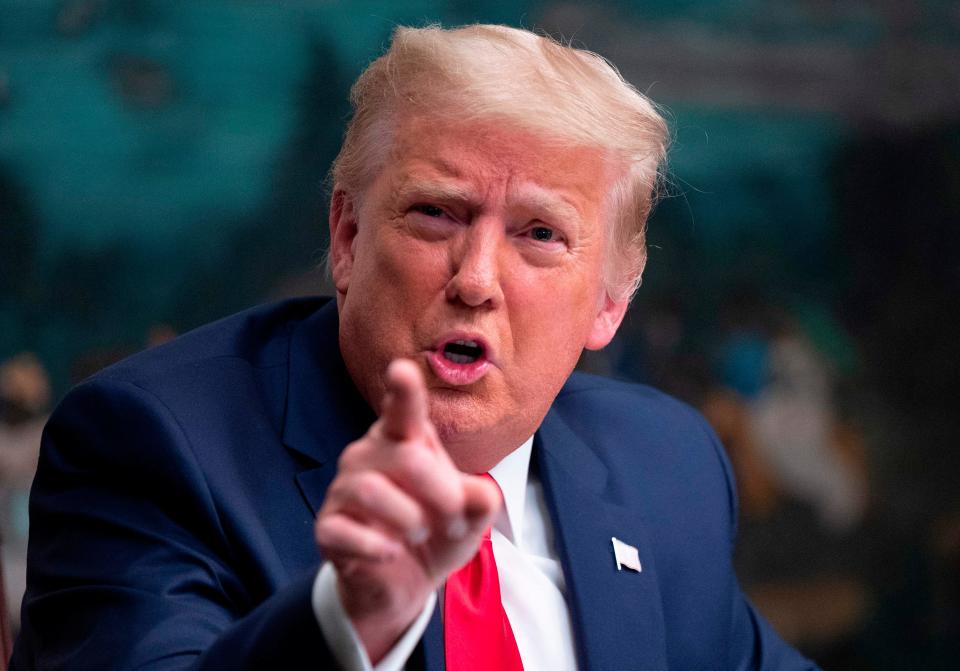Is Trump’s ‘big lie’ Democrats’ big chance to entice Republican voters?
- Oops!Something went wrong.Please try again later.
Would Republicans in Washington stand by Donald Trump’s “big lie” if they knew it could cost the party a fifth of its voters?
A nationally representative Reuters/Ipsos poll conducted in the days following the Capitol insurrection confirmed the large number of Republicans who believe Trump’s false assertion that the 2020 election was the result of illegal voting or rigging: 62% of the GOP, plus 17% who are “not sure” about the election’s legitimacy. However, the poll also shows how the remaining 21% of Republicans who believe the results were accurate and legitimate may be poised to vote for Democrats in the future.
Among the Republicans who accept the 2020 results, only 44% voted for Trump last November, and 36% already voted for President Joe Biden.
Breakdown of numbers among Republicans
Recently, their opinions of Trump have dropped precipitously. While 42% of those Republicans who accept the 2020 election results approved of President Trump’s job handling in November, only 26% approved during his final days in office. In fact, a majority of them believed Trump should have been removed via impeachment, resignation or the invocation of the 25th Amendment after the insurrection.
Among Republicans who believe the big lie, 90% approved of Trump’s job handling in his final days.
Republicans who accept the 2020 election results also seem to like President Biden. Two-thirds approve of his job performance — about double the number that report voting for him.

Biden has consistently emphasized his intention to serve all Americans — whether or not they voted for him in the 2020 election.
On the surface, Biden’s statements were designed to strike a contrast with Trump, who outwardly sought retribution against the people and regions of the country that voted against him in the 2016 election. However, Biden has also bristled at the puritanical progressivism among some Democrats who would rather narrow their coalition than compromise for the sake of passing legislation or welcoming new constituents with some disagreeable ideas.
During the 2020 campaign, he positioned himself as a legislator who crossed the aisle to work with Republicans. Unity has been his trademark. In Republicans who accept his victory, Biden could find a constituency to broaden the Democratic coalition and promote bipartisanship.
In the poll, almost half of these Republicans already support Democratic pursuits like rejoining the Paris climate accord, national police reform and statehood for Washington, D.C., and Puerto Rico — nonstarters for Republicans who believe the big lie. Smaller shares support a carbon tax, "Medicare for All" and reentering the Iran nuclear deal, and similar numbers don’t have strong views on these matters.
Impeachment: Of course the Senate can hold a Trump impeachment trial. There's no real legal argument against it.
Compared with other Republicans, those who accept the 2020 results are more likely to be university-educated, members of ethnic minorities, suburban or urban, and from Western states — all groups more aligned with Democratic demographics. They are also less likely to receive their news from the right-wing television outlets that spread falsehoods associated with Biden’s victory, which would make them more likely to hear any future appeals from the Democrats.
Redefining lines in the GOP
While there were always some Republicans who resisted Trump’s takeover of their party, his 2016 victory suggested that their numbers were small enough that the party could win without them. The new polling raises the stakes of the coming impeachment trial, but also broader decisions about the future orientation of the GOP.
Even though many political observers lament how the Grand Old Party has been reduced to a personality cult, 56% of self-identifying Republicans still see themselves as “traditional Republicans” rather than as “Donald Trump supporters,” who make up 36%.
Republicans and Trump: How we're holding Republicans responsible for cleaning up the Trump mess
Should 17 Senate Republicans join 50 Democrats to impeach the former president, they will surely infuriate a third of their ranks in the short run, but most would likely continue to support the party in the long run. The question is, if Republican Senators don’t impeach Trump and don’t reorient the party’s future, what will be the response of “traditional Republicans” who conceivably could cross the aisle?
Despite all the focus on how many Republicans continue to believe Trump’s big lie, the answer to this critical question and upcoming American elections could pivot on those who don’t.
Justin Gest (@_JustinGest) is an associate professor at George Mason University’s Schar School of Policy and Government. He is the author of "The New Minority: White Working Class Politics in an Age of Immigration and Inequality."
You can read diverse opinions from our Board of Contributors and other writers on the Opinion front page, on Twitter @usatodayopinion and in our daily Opinion newsletter. To respond to a column, submit a comment to letters@usatoday.com.
This article originally appeared on USA TODAY: Trump has given Democrats a chance to poach Republican voters

